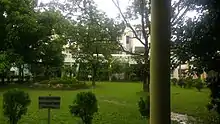 | |
| Type | Film school |
|---|---|
| Established | 1995 |
| Budget | ₹95.13 crore (US$12 million) (2023-24 est.)[1] |
| Chairman | Secretary, MIB |
| President | Suresh Gopi |
| Director | Himansu Sekhar Khatua |
| Location | , , 22°29′05″N 88°23′43″E / 22.4848°N 88.3953°E |
| Campus | Urban 40 acre |
| Affiliations | CILECT |
| Website | srfti.ac.in |
 | |
Satyajit Ray Film and Television Institute (SRFTI) is a film and television institute located in Baghajatin, Kolkata, West Bengal, India. Named after Indian filmmaker Satyajit Ray, the institute provides higher and professional education and technical expertise in the art and technique of film-making and television production. Established in 1995, the institute is an autonomous society funded by Ministry of Information and Broadcasting, Government of India.[2][3]
A member of CILECT (International Liaison Centre of Schools of Cinema and Television), in 2019 SRFTI was ranked among the best film schools in the world, along with the Film and Television Institute of India (FTII) and the National School of Drama, New Delhi by the CEOWorld Magazine.[4][5][6]
History
The SRFTI was established in 1995, and registered as a Society on 18 August 1995 under the West Bengal Societies Registration Act, 1961, and is an autonomous society funded by Ministry of Information and Broadcasting, Government of India.[3] It has been named after acclaimed Indian film director, Satyajit Ray.[4] The first session began on September 1, 1996, while Dr Debasish Majumdar joined as the institute's first director in 1997.[2]

Administration
The institute is governed by an autonomous body with Governing Council, Standing Finance Committee and an Academic Council. The institute is under the Ministry of Information and Broadcasting of the Government of India.
It has the following departments in the Film Wing:
- Department of Direction & Screenplay Writing
- Department of Sound Recording and Design
- Department of Editing
- Department of Cinematography
- Department of Producing for Film & Television
- Department of Animation Cinema
and the following departments in the Electronic & Digital Media Wing :
- Department of Electronic and Digital Media Management
- Department of Writing for Electronic and Digital Media
- Department of Direction & Producing for Electronic and Digital Media
- Department of Cinematography for Electronic and Digital Media
- Department of Editing for Electronic and Digital Media
- Department of Sound for Electronic and Digital Media
Notable faculty
Notable alumni[7]
Direction & Screenplay Writing
- Vipin Vijay (Chitrasutram)
- Anjalika Sharma (Meena Jha - Best First Non-Feature Film of a Director at 48th National Film Awards)
- Amal Neerad (Big B, Iyobinte Pusthakam, Bheeshma Parvam)
- Sagar Ballary (Bheja Fry, Hum Tum Shabana)
- Tridib Poddar (Khoj - official selection in competition in the Cinefoundation section at Cannes Film Festival, 2002)
- Anirban Dutta (In For Motion - Best Environment/Conservation/Preservation Film and Best Agriculture Film at 57th National Film Awards)
- Haobam Paban Kumar (AFSPA 1958 - Best Non-Feature Film at 56th National Film Awards, Mr. India - Best Film on Social Issues at 57th National Film Awards)
- Bishnu Dev Halder (Bagher Bacha - Best Film on Social Issues at 55th National Film Awards)
- Kanu Behl (Oye Lucky! Lucky Oye!, Love Sex Aur Dhokha, Titli)
Cinematography
- Raktim Mondal (Cheeni Kum, Ami, Yasin Ar Amar Madhubala)
- Dipayan Chaudhuri (Hoi Choi, Hawa Bodol, Maach Misti & More)
- Sivakumar Vijayan (Vidiyum Munn, Saala Khadoos)
- Siddharth Diwan (Titli, Bulbbul, Jayeshbhai Jordaar)
Sound Recording & Design
- Subhadeep Sengupta (Chitrasutram - Best Audiography (sound design) at 58th National Film Awards, Chalo Let's Go)
- Tapas Nayak (Bheja Fry 2, Kachcha Limboo, Raavan)
- Partha Barman (Bishar Blues - Best Non-Feature Film Audiography at 54th National Film Awards)
- Sanjay Chaturvedi (Kai Po Che, Zindagai Na Milegi Dobara)
- Hitesh Chaurasia (Gajaar: Journey of the Soul - V. Shantaram Best Sound Award 2012)
- Pritam Das (Love Sex Aur Dhokha, Shanghai, Ladies vs. Ricky Bahl)
Editing
- Saikat S. Ray (Hope Dies Last in War - Best Non-Feature Film Editing at 55th National Film Awards)
- Atanu Mukherjee (Monsoon Shootout)
- Tinni Mitra (Germ - Best Non-Feature Film Editing at 58th National Film Awards)
- Namrata Rao (Ishqiya, Band Baaja Baaraat, Kahaani, 2 States, Fan)
See also
- Cinema of India
- Bhartendu Natya Academy
- Film and Television Institute of India
- State Institute of Film and Television
- Government Film and Television Institute
- K. R. Narayanan National Institute of Visual Science and Arts
- M.G.R. Government Film and Television Training Institute
- Jyoti Chitraban Film and Television Institute
- Biju Patnaik Film and Television Institute of Odisha
References
- ↑ "Budget allocates Rs 4,692 crore for information and broadcasting ministry". Eastmojo.
- 1 2 "Our Institute". Satyajit Ray Film and Television Institute. Retrieved 25 March 2020.
- 1 2 "Satyajit Ray Film and Television Institute, Kolkata". Ministry of Information and Broadcasting. Retrieved 25 March 2020.
- 1 2 "About Satyajit Ray Film & Television Institute". Satyajit Ray Film & Television Institute. Retrieved 25 March 2020.
- ↑ Dimitropoulou, Alexandra (23 July 2019). "Best Film Schools In The World For 2019". CEOWorld Magazine. Retrieved 25 March 2020.
- ↑ Suresh, Pradeep (24 July 2019). "These three Indian institutes are among the world's best film schools". CNBC TV18. Retrieved 25 March 2020.
- ↑ "Alumni". Satyajit Ray Film and Television Institute. Retrieved 25 March 2020.